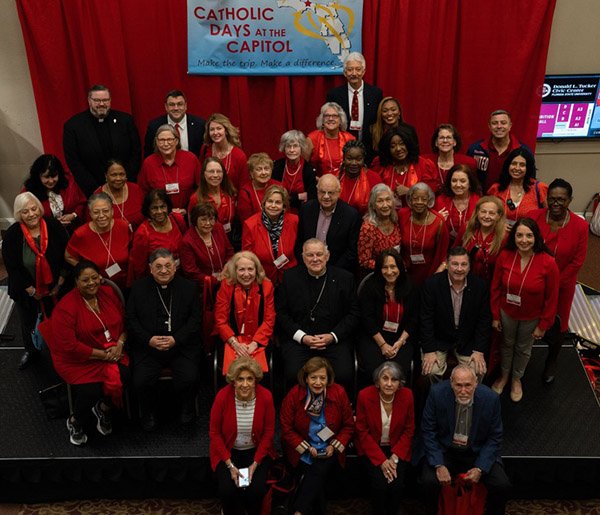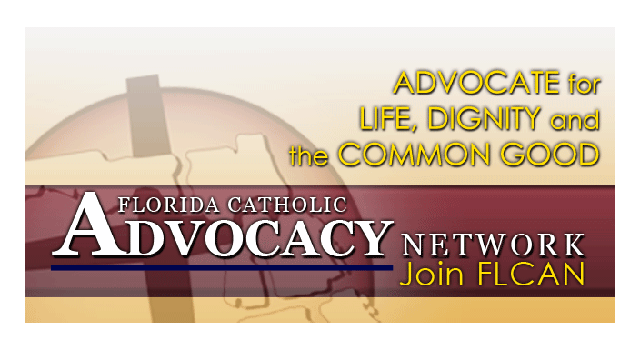By Florida Catholic staff - Florida Catholic
ORLANDO | The 2023 Florida legislative session started March 7, 2023 with extra observers — some 300 Catholic faithful advocating for issues important to the Catholic Church.
Each year during the legislative session, Catholics from across Florida gather in Tallahassee to put their faith and civic responsibility into action at Catholic Days at the Capitol. The two-day event, held March 7-8, 2023, offers participants the opportunity to see the legislative process in action. More than 300 Catholics from Florida’s archdiocese and six dioceses participated in the annual event.

Photographer: COURTESY
At Catholic Days in the Capitol breakfast, Archbishop Thomas Wenski and Auxiliary Bishop Enrique Delgado take a photo with members of the Archdiocese of Miami who traveled to Tallahassee to lobby state legislators and senators on issues of importance to the Catholic Church.
On March 7, they shared a breakfast with Florida’s bishops and legislators, and later each delegation took a group photo with their bishop. A highlight of the event is the 48th annual Red Mass of the Holy Spirit, which was concelebrated by Florida’s bishops March 8, to pray for those working in the legislative, judicial and executive branches of government. The homily was offered by Florida’s newest bishop — Bishop Erik Pohlmeier of St. Augustine, who focused about who “human beings are made for flourishing and participation in society,” and that participation takes on many different forms. Most crucially participation in society should be being in service to others — “especially the poor and the lost.”
Participants took those words to heart when during the event they spoke with their respective legislators (Florida House representatives and Florida senators) in individual meetings. Before those meetings, the conference offered a legislative briefing that focused on three bills that could serve as discussion points. Its backgrounders also offer responses to possible objections legislators might raise to explain their opposite stance on a bill.
DEATH PENALTY
In 2016, the U.S. Supreme Court case in Hurst v. Florida found that Florida’s death penalty scheme violated the U.S. Constitution which requires a jury, not a judge, to find each fact necessary to impose a death sentence. With the favor of Florida’s voters, the Florida legislature responded by abolishing non-unanimous jury recommendations for death in 2017.
Despite citizens voting to support that piece of legislation, there is political will in the Florida legislature to make it easier to impose death sentences by deleting the statutory unanimous jury requirement and reverting to a supermajority (8-4) requirement. The Florida Conference of Catholic bishops asked advocates to tell their legislators to retain unanimous jury recommendation by opposing House Bill 555/Senate Bill 450.
According to the talking points offered by the conference, this bill would take Florida backwards to an outlier status with the lowest standard for imposing a death sentence. It also stated:
- In every instance in which a jury is summoned in Florida, it is required to make a unanimous decision;
- Juror unanimity helps to ensure a more reliable and fairer death penalty sentencing scheme by promoting deliberation and engaging every juror in the process.
With Florida being the national outlier in a high number of death sentences, executions, death row population and death row exonerees, participants were reminded instituting death penalty should not be made easier. Citing the alternative of life without the possibility of parole, the conference explained it is unnecessary to apply the death penalty. The conference continually dispels familiar myths related to the death penalty, including that the death brings closure to murder victims’ family members, even though many murder victims’ family members have publicly expressed that the years of litigation and uncertainty exacerbates their grief.
“People who commit mass murder deserve punishment by society and for society to be protected from them. This can be done through life in prison without the possibility of parole, which is a severe sentence,” the conference explained through the backgrounder. “However, if Florida continues to implement the death penalty, we need to keep the process as fair as possible. Unanimity is already required in every other circumstance when a jury is summoned in Florida.”
ABORTION LIMITS
Advocates were encouraged to ask their legislators to support House Bill 7/Senate Bill 300, which prohibits abortion after detection of a heartbeat — six weeks of gestation.
“We seek legislation to increase protection of women and unborn children by shrinking the window of time in which an abortion may legally be obtained,” the conference stated in its backgrounder. “Prohibiting abortion procedures after 6 weeks gestation would align with scientific research demonstrating that unborn children have beating hearts by this gestational period.”
Exceptions to the bill’s six-week abortion ban are allowed for saving the life of the mother, for avoiding an irreversible and substantial impairment of a major bodily function of the mother, for fatal fetal abnormalities up to the third trimester, and for rape and incest up to 15 weeks gestation.
HB 7 also includes several provisions providing vital pregnancy and parenting support for families, including an increase from $4 million to $25 million to support pregnant women and their young children. Additionally, the bill prohibits state funding from assisting women traveling out of state to obtain abortion services and prohibits telehealth from being used to provide abortion services.
While this bill is not perfect, it is a tremendous improvement over current law and is supported by the FCCB.
HB 7 is scheduled for its first committee hearing in the Florida House on Thursday, March 16.
EDUCATIONAL CHOICE
According to the conference, Florida can “promote the common good by protecting the right of children to receive an education. While supporting a strong system of public schools, no one segment of society should have a monopoly in education.”
With that in mind, the conference asked Catholic Days participants to ask their legislators to support House Bill 1/Senate Bill 202 and expand access to state scholarship programs for all students and convert state scholarships to educational savings accounts.
According to the conference, 200,000 students are currently enrolled in Florida’s scholarship programs that are income-based or based on special need. These bills would expand Florida funding based on per-pupil basis. Schools are provided funds for each student enrolled at the school. Therefore, if a student leaves to attend a private school, then the public school no longer needs the funds for that student.
The conference added that state funding allocation is only a portion of the total public-school funding. “If a student disenrolls from a public school, it does not lose any of its local funding or supplementary state funding that is not tied to enrollment,” the conference explained.
Bill provisions could offer the following:
- Makes educational savings accounts (ESAs) available to all families including homeschool students regardless of income;
- Converts the income-based scholarship to an educational savings account to allow parents more flexibility in spending scholarship funds;
- Significantly increases access to larger scholarships for students with disabilities by increasing the enrollment cap.
To stay informed about ongoing issues in Tallahassee that the Florida bishops are concerned about, go to https://flaccb.org/about-flcan.

